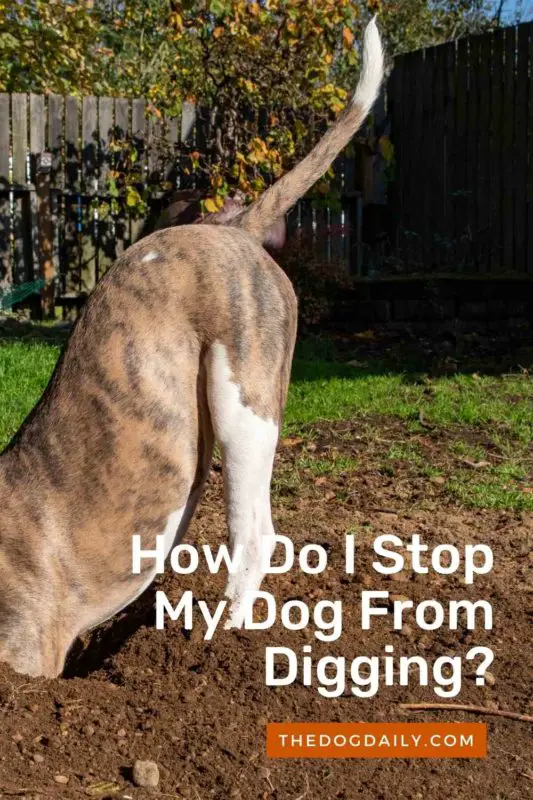How Do I Stop My Dog from Digging?
Most dogs like to dig, and getting them to stop can be like withholding candy from a trick-or-treater. Christi Jones of San Fernando, Calif., an active participant in the Westside German Shepherd Rescue Group, learned this the hard way with Boaz, her four-year-old Shepherd. She says, “My dog didn’t dig until my two boys dug to make mud pies. Then, Boaz decided to help them out.” After that, her dog was hooked. “It was annoying because I’d fall into the holes or trip over them.”
Depending on the holes’ location, dog digging can range from a nuisance to a serious hazard. It almost always drives dog owners — and their neighbors — crazy. Rest assured, if you have a digger on your hands, you are not alone.
Do All Dogs Dig?
Laura Bourhenne, a Los Angeles dog trainer, who was the go-to trainer when VIPs on the hit TV show Frasier needed help with their pups, says, “Most dogs experiment with digging at some point in their life… The dogs that make a habit of it usually do it because they are bored to death.”
The following steps will help to minimize your dog’s desire to dig:
-
Tire out your dog
Jones, who has not only resolved her own dog’s digging issues but who has also worked with foster dogs that dig, suggests, “Walk your dog for at least 45 minutes once a day. Play with him and stimulate him mentally with exercises and so forth.” Bourhenne points out that your involvement is critical. “The time your dog spends alone in the yard does not count since your dog is most likely sleeping.”
-
Keep your dog busy
On those days when you know your dog’s exercise or playtime is going to get cut short, Bourhenne recommends you spread kibble over a clean surface in your home or yard area. She says, “Your dog has to use his brain when he uses his nose to find every piece of food, which will tire him out.” This activity also takes up a fair amount of time, which will keep your dog occupied.
-
Make your dog part of the family
According to Jones, “If your dog hangs out in the house with you — if he’s part of the family and in on the fun and fellowship, he’s less likely to dig.” Remember, dogs are pack animals, so even if you are doing something solitary, like reading or watching TV, your dog will be happier in your presence.
Still digging?
You’ve exercised your dog to the point that you’ve lost 10 pounds, you’ve developed tennis elbow from the endless games of fetch, and family time has become so canine-inclusive that your friends and kids have started setting a place for your pup at the dinner table. And yet, your dog is still digging. Don’t throw in the towel yet. Even if you have a committed digger, you can stop your dog from digging destructively. When working with clients privately, Bourhenne recommends the following tips you can use with your dog.
Diehard Diggers Do’s and Don’ts
-
Do deter your dog from digging
Fill your dog’s favorite hole with dog poop and then cover it with dirt or lay chicken wire under gravel, mulch, or decorative bark. (Can’t stomach dog poop? Some dog trainers recommend rocks as an alternative.)
-
Do create a designated digging hole
Follow these steps:
1) buy a big, sturdy plastic bin
2) dig a hole and put the bin in the ground
3) fill the bin with sand
4) bury treats and toys in the sand to entice your dog to dig
5) shower your dog with praise and affection for digging in the right spot.
-
Don’t let your dog see you dig
According to Bourhenne, “Dogs dig to hide things for later. If your dog sees you digging, he is going to think you are hiding something that he may want.” Be sure your dog does not see you planting in your garden or flowerbed. Otherwise, your dog will assume that beneath those flowers lay treats.
-
Don’t play with your dog right after it has dug
Do this, and all your dog will learn is that digging gets you to play. If you catch your dog in the act, Bourhenne says, “Scream to get your dog’s attention, such as by shouting, ‘No!’ and then walk away.”
-
Don’t leave your dog unsupervised in the presence of fresh dirt
According to Bourhenne, dogs are drawn to freshly planted flowerbeds and gardens.
“The dirt is fresh. It smells different, and it is softer, which all make it more fun to dig in.”
If you have a setback, do not be too hard on yourself or your dog. Bourhenne, a professional dog trainer, said she always knew when she wasn’t playing with her Terrier enough when she would walk outside and “the backyard would look like the Grand Canyon.” Be diligent about making sure your dog gets plenty of exercise, stimulation, and family interaction. Also, follow these do’s and don’ts, and your dog’s desire to dig will be stopped (or appropriately channeled) in no time.
Article written by Author: Cricky Long

